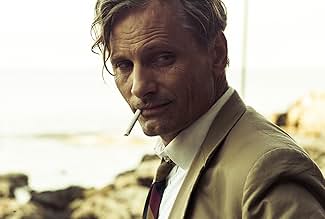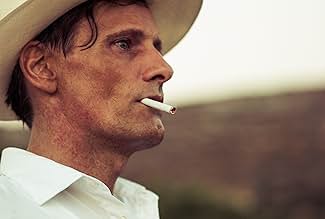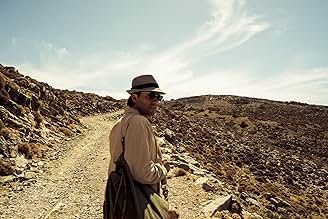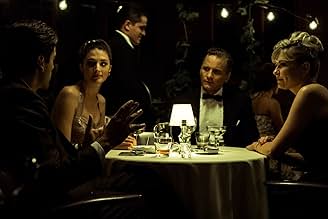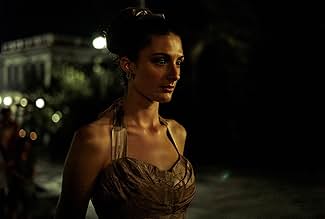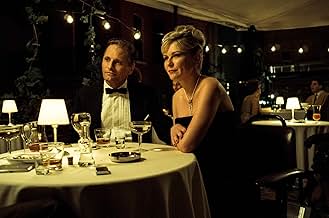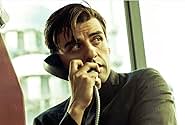NOTE IMDb
6,2/10
35 k
MA NOTE
1962. Un couple de touristes américains très élégants arrive à Athènes. Ils rencontrent Rydal, un guide américain parlant grec, arnaqueur de touristes à l'occasion. Séduit et impressionné, R... Tout lire1962. Un couple de touristes américains très élégants arrive à Athènes. Ils rencontrent Rydal, un guide américain parlant grec, arnaqueur de touristes à l'occasion. Séduit et impressionné, Rydal accepte leur invitation à dîner.1962. Un couple de touristes américains très élégants arrive à Athènes. Ils rencontrent Rydal, un guide américain parlant grec, arnaqueur de touristes à l'occasion. Séduit et impressionné, Rydal accepte leur invitation à dîner.
- Réalisation
- Scénario
- Casting principal
- Récompenses
- 3 nominations au total
Babis Hatzidakis
- Stall Keeper
- (as Babis Chatzidakis)
Stella Fyrogeni
- Barmaid
- (as Stela Fyrogeni)
Avis à la une
'The to faces of January' is an old-fashioned, decent thriller with a nice sixties setting and solid acting. Everything about it is immaculate. The plot is intelligent enough: a couple of rich tourists meet a young American tour guide, who accidentally witnesses the husband committing a crime. One thing leads to another, and soon enough the guide is caught in a web of lies and deceit, and it becomes impossible to escape without incriminating himself. The crime story is spiced up by the mutual romantic attraction between the guide and the young wife. There is even a sort of life lesson included: money is the root of all evil.
The movie is well worth seeing, if only because it is nice to see a film that's not experimental, violent, provocative, filled with special effects or in one way or another trying to be hip or trendy.
I can see why so many reviewers make references to Hitchcock. The film is set in the early sixties, the era in which Hitch made some of his best films like 'The Birds' or 'Marnie'. Still, this film lacks the touch of a genius like Hitchcock. The characters have no extra psychological layers, and the unconventional scenes and themes that make the Hitchcock-movies so special, are absent in this film.
The movie is well worth seeing, if only because it is nice to see a film that's not experimental, violent, provocative, filled with special effects or in one way or another trying to be hip or trendy.
I can see why so many reviewers make references to Hitchcock. The film is set in the early sixties, the era in which Hitch made some of his best films like 'The Birds' or 'Marnie'. Still, this film lacks the touch of a genius like Hitchcock. The characters have no extra psychological layers, and the unconventional scenes and themes that make the Hitchcock-movies so special, are absent in this film.
An old school, Hitchcockian style thriller from the writer behind Drive, The Two Faces of January commences with sexy, mysterious intrigue, but slowly dovetails into a soggy noodle. Shot against the glorious, sun-drenched Greek landscape by cinematographer Marcel Zyskind and boasting immaculate costume and set design befitting its 1960s period, January looks a million bucks, yet this can't cover up the fact the final hour is bland and devoid of tension. One of the finest (and underrated) actors of our generation, Oscar Isaac is once again astounding despite his failing surrounds, here portraying the smooth, enigmatic operator who gets in over his head when he witnesses a crime by an attractive American couple. As the wealthy tourists with a secret, Kirsten Dunst and Viggo Mortensen are another major weakness, the duo sharing zero spark together and Mortensen in particular possessing all the charisma of a plank of wood. It's a noble directorial debut from screenwriter Hossein Amini, but remains a missed opportunity in a subgenre not visited nearly enough.
Adapted by its director, Hossein Amini, from a little known novel by Patricia Highsmith "The Two Faces of January" turns out to be a highly satisfying tale of murder most foul very typical of Miss Highsmith. OK, so it's not on the same level as "The Talented Mr Ripley", "Plein Soleil" or "Strangers on a Train" but with its emphasis on plot rather than 'action' it's still a cut above a good many of today's so-called thrillers. Also typical of Highsmith is that the principal relationship in the film is between two men, (though one of them is married while the other starts to fall for the wife). The married one is Viggo Mortensen, apparently rich and touring Greece but also harboring a dark secret. The wife is pert little Kirsten Dunst and the man who falls for her is tour guide Oscar Issac. At first Issac thinks he has the upper hand, swindling Mortensen out of a few thousand dollars only to realize quite early in their relationship that he has bitten off more than he can chew. After awhile Dundst's character becomes almost redundant as the men start to play power games with each other. Whereas the male/male relationships in other Highsmith adaptations were mostly homo-erotic with at least one of the characters clearly drawn as gay. Here the relationship is meant to evoke a father and a son, (Issac's character has issues with his dead father). This slightly dilutes the dark heart of the picture. Movies like "The Talented Mr Ripley" and "Strangers on a Train" worked as well as they did because the villain was clearly homosexual and psychopathic and you never knew where his temper and jealous rages might take him. In this movie Mortensen is undoubtedly the jealous straight guy while Issac is just too nice, (he's too sweet to be a real con-man). Still, all three leading players are excellent and Amini tightens the screws very nicely as the film progresses. Filmed, for the most part, in Greece it will also prove something of a boost for the Greek Tourist Board this summer.
I have to applaud Hosseini's directorial debut. "The Two Faces Of January" takes us mostly to the 1960's Greece, with three main characters in focus.
Beautifully shot, this visually stunning period-piece (if I can call it that) relies on story and characters rather than trying to impress with extravagant plot twists and special effects. The narrative is very well balanced and restrained from the hyperactive traps of modern cinematic storytelling.
Good acting from everyone involved and my compliments to the music composer too, for providing a very fitting soundtrack.
This is classic film making. Nothing innovative but very beautiful to look at, a fitting choice to watch on a lonely evening.
Beautifully shot, this visually stunning period-piece (if I can call it that) relies on story and characters rather than trying to impress with extravagant plot twists and special effects. The narrative is very well balanced and restrained from the hyperactive traps of modern cinematic storytelling.
Good acting from everyone involved and my compliments to the music composer too, for providing a very fitting soundtrack.
This is classic film making. Nothing innovative but very beautiful to look at, a fitting choice to watch on a lonely evening.
The Two Faces of January is a gripping and highly watchable film which I would highly recommend. Set in the sixties, it is undeniably "old school" – a twisted tale of murder, treachery and double-dealing, based on the novel by Patricia Highsmith, where you half expect Alfred Hitchcock to appear in cameo at some point.
Viggo Mortensen (Lord of the Rings) and Kirsten Dunst (Spiderman) play Chester and Colette Macfarland a rich and affluent couple touring the sites and sounds of Europe, with us first catching up with them in a glorious looking Athens.
Appearing to be relaxed and happy together, they hide a dark secret that is about to catch up with them. Oscar Isaac – so fabulous in Finding Llewyn Davis earlier this year, and about to hit mega-stardom in the Star Wars reboot – plays American rogue Rydal, who seems to stare intently at Chester. Is he part of the impending storm, or just an innocent caught up in events he can't control? Tensions rise, not just because of the plot pressures but also because of the obvious sexual tension growing between the charismatic Rydal and Chester's lovely and much younger wife.
The compelling story – albeit somewhat predictable in places – takes in some fabulously atmospheric locations in Athens, Crete and Istanbul.
This is the feature directorial debut of Iranian-born Hossein Amini, who also wrote the screenplay – this being his forte have written a range of films including Drive and Snow White and the Huntsman. And what a good job he does, orchestrating location, lighting and music to great effect. Some of the editing is also very tight, cutting away from scenes at crucial points to maintain the story's mystery.
The trio of actors also bring great star power to their roles. Mortensen and Dunst are very watchable, but it is Isaac that again really shines in his role. In turns enchanting, brooding and cowed like a cornered animal, he plays the perfect James Stewart character in this Hitchcockian homage.
In the coming blitzkrieg of summer blockbusters, here is a jewel of a film that will be particularly enjoyed by older viewers who remember when story and location were put far ahead of CGI-based special effects.
(If you found this review helpful, please see my other reviews and 'Follow the Fad' at bobmann447.wordpress.com. Thanks.).
Viggo Mortensen (Lord of the Rings) and Kirsten Dunst (Spiderman) play Chester and Colette Macfarland a rich and affluent couple touring the sites and sounds of Europe, with us first catching up with them in a glorious looking Athens.
Appearing to be relaxed and happy together, they hide a dark secret that is about to catch up with them. Oscar Isaac – so fabulous in Finding Llewyn Davis earlier this year, and about to hit mega-stardom in the Star Wars reboot – plays American rogue Rydal, who seems to stare intently at Chester. Is he part of the impending storm, or just an innocent caught up in events he can't control? Tensions rise, not just because of the plot pressures but also because of the obvious sexual tension growing between the charismatic Rydal and Chester's lovely and much younger wife.
The compelling story – albeit somewhat predictable in places – takes in some fabulously atmospheric locations in Athens, Crete and Istanbul.
This is the feature directorial debut of Iranian-born Hossein Amini, who also wrote the screenplay – this being his forte have written a range of films including Drive and Snow White and the Huntsman. And what a good job he does, orchestrating location, lighting and music to great effect. Some of the editing is also very tight, cutting away from scenes at crucial points to maintain the story's mystery.
The trio of actors also bring great star power to their roles. Mortensen and Dunst are very watchable, but it is Isaac that again really shines in his role. In turns enchanting, brooding and cowed like a cornered animal, he plays the perfect James Stewart character in this Hitchcockian homage.
In the coming blitzkrieg of summer blockbusters, here is a jewel of a film that will be particularly enjoyed by older viewers who remember when story and location were put far ahead of CGI-based special effects.
(If you found this review helpful, please see my other reviews and 'Follow the Fad' at bobmann447.wordpress.com. Thanks.).
Le saviez-vous
- AnecdotesViggo Mortensen on his character's wardrobe: "I particularly liked the white linen suit that you see in the poster that Chester wears, and in a way that's another character in the movie because the journey of that beautiful cream-colored linen suit, on the Acropolis in the sunshine in the beginning, this immaculate, perfect, fits perfectly, looks great. You see that suit at the very end of the story, and that suit's been through it, it's a bit torn, it's frayed, it's not as clean as it was, it's suffered almost as much as the man wearing the suit."
- GaffesIn the beginning Rydal recounts the legend of Aegeus on the steps of the Acropolis and says that it was there that Aegeus jumped to his death after his son, Theseus returned from Crete and forgot to change the black sails to white to denote his success. This is untrue; you would not be able to see the Aegean from the Acropolis, anyway. According to the legend Aegeus was waiting for the ships to arrive at Cape Sounion and when he saw the black sails he plunged into the sea (which is called the Aegean Sea after him). It is unlikely that a tour guide would not know how to recount the legend properly.
- Citations
Chester MacFarland: I'm sorry I disappointed you.
- Crédits fousAfter the production company logos, there are no opening credits.
- ConnexionsFeatured in Film '72: Épisode datant du 5 mars 2014 (2014)
Meilleurs choix
Connectez-vous pour évaluer et suivre la liste de favoris afin de recevoir des recommandations personnalisées
- How long is The Two Faces of January?Alimenté par Alexa
Détails
- Date de sortie
- Pays d’origine
- Sites officiels
- Langues
- Aussi connu sous le nom de
- The Two Faces of January
- Lieux de tournage
- Sociétés de production
- Voir plus de crédits d'entreprise sur IMDbPro
Box-office
- Budget
- 31 000 000 $US (estimé)
- Montant brut aux États-Unis et au Canada
- 507 463 $US
- Week-end de sortie aux États-Unis et au Canada
- 43 116 $US
- 28 sept. 2014
- Montant brut mondial
- 13 551 951 $US
- Durée1 heure 36 minutes
- Couleur
- Mixage
- Rapport de forme
- 2.35 : 1
Contribuer à cette page
Suggérer une modification ou ajouter du contenu manquant

Lacune principale
By what name was Two Faces of January (2014) officially released in India in English?
Répondre






